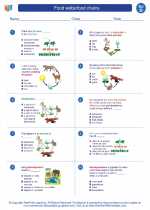Food webs/food chains -> kidneys
Kidneys
The kidneys are two bean-shaped organs located on either side of the spine, below the ribs. They play a crucial role in the body's overall functioning by filtering waste and excess fluids from the blood to form urine. The kidneys also help regulate blood pressure, balance electrolytes, and produce important hormones.
Structure of the Kidneys
The kidneys are made up of millions of tiny structures called nephrons, which are the functional units responsible for filtering the blood. Each nephron consists of a renal corpuscle, which includes a cluster of capillaries called the glomerulus, and a renal tubule. The renal tubules are where the process of urine formation takes place, including reabsorption of essential substances and secretion of waste products.
Functions of the Kidneys
The main functions of the kidneys include:
- Filtration: The kidneys filter the blood to remove waste products and excess substances, which are then excreted as urine.
- Regulation of Water and Electrolyte Balance: The kidneys help maintain the body's fluid and electrolyte balance by adjusting the excretion of water and electrolytes based on the body's needs.
- Regulation of Blood Pressure: The kidneys play a key role in regulating blood pressure by controlling the volume of blood and the levels of certain hormones.
- Production of Hormones: The kidneys produce hormones such as erythropoietin, which stimulates the production of red blood cells, and renin, which helps regulate blood pressure.
Common Kidney Disorders
Some common disorders that can affect the kidneys include:
- Chronic Kidney Disease (CKD): A long-term condition where the kidneys gradually lose function over time.
- Kidney Stones: Hard deposits of minerals and salts that can form in the kidneys and cause severe pain when passing through the urinary tract.
- Urinary Tract Infections (UTIs): Infections that can affect the kidneys, ureters, bladder, and urethra, leading to discomfort and potential complications if left untreated.
Study Guide
- Describe the structure of a nephron and its role in urine formation.
- Explain the functions of the kidneys in maintaining the body's overall balance.
- Discuss the importance of kidney hormones in regulating various bodily functions.
- Identify and describe at least two common disorders that can affect the kidneys.
◂Science Worksheets and Study Guides Fourth Grade. Food webs/food chains

 Activity Lesson
Activity Lesson
 Worksheet/Answer key
Worksheet/Answer key
 Worksheet/Answer key
Worksheet/Answer key
 Worksheet/Answer key
Worksheet/Answer key
 Worksheet/Answer key
Worksheet/Answer key
 Vocabulary/Answer key
Vocabulary/Answer key
 Vocabulary/Answer key
Vocabulary/Answer key
 Vocabulary/Answer key
Vocabulary/Answer key
